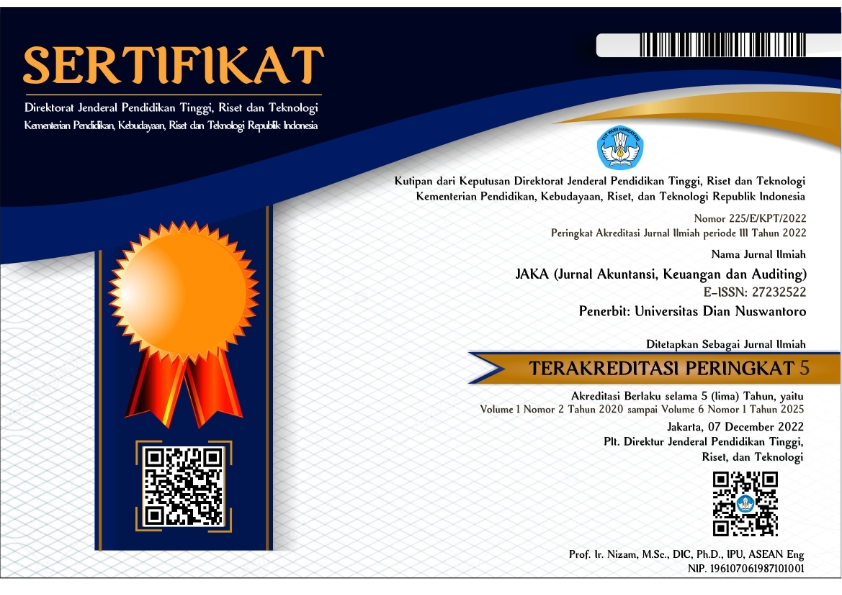Faktor-faktor yang Mempengaruhi Niat Mahasiswa Mengikuti Kuliah Akuntansi dengan E-learning: Pendekatan Theory of Planned Behavior
DOI:
https://doi.org/10.56696/jaka.v4i1.9174Abstract
One of the impacts of the COVID-19 pandemic in Indonesia is the shift from face-to-face learning to online distance learning or e-learning. One educational institution that adopts this learning system is a college or university. The institution must provide an e-learning system based on LMS (Learning Management System) to help manage and organize the learning process, especially in Accounting. Improve the ability and understanding of accounting for students. This research aims to analyze student learning behaviour through LMS-based e-learning with the Theory of Planned Behavior approach. The research data is primary data obtained through questionnaires with Dian Nuswantoro University accounting study program students as respondents with a sample of 100 students. The data analysis method used in the study was SEM (Structural Equation Modeling) using the SmartPLS application. Exogenous variables include attitudes towards behaviour, subjective norms, and perceived behavioural control, while endogenous variables include behavioural interest and behaviour. The results of this research analysis are that attitude towards behaviour; and subjective norms significantly positively affect behavioural interest. Perceived behavioural control has no significant effect on behavioural interest. Behavioural interest significantly affects the behaviour of using or accepting LMS-based e-learning as an accounting learning tool.Keywords: attitudes toward behavior; subjective norms; perceived behavioral control; behavioral intention.References
Adwitiya, A. B. (2022). Intensi Penggunaan E-learning Guru Pendidikan Anak Usia Dini. SOSMANIORA (Jurnal Ilmu Sosial Dan Humaniora), 1(4), 576–582. https://doi.org/10.55123/sosmaniora.v1i4.1220
Afichamala, W., & Hariyanto, W. (2021). Learning Accounting Using E-Learning In The Covid-19 Period As An Effort To Improve Student Understanding And Academic Quality. Academia Open, 5, 1–12. https://doi.org/10.21070/acopen.5.2021.2119
Ajzen, I. (1991). The Theory of Planned Behavior. Organizational Behavior and Human Decision Processes, 50, 179–2011. https://doi.org/10.47985/dcidj.475
Anthony Jnr, B., Kamaludin, A., Romli, A., Mat Raffei, A. F., A_L Eh Phon, D. N., Abdullah, A., Leong Ming, G., A Shukor, N., Shukri Nordin, M., & Baba, S. (2020). Predictors of blended learning deployment in institutions of higher learning: theory of planned behavior perspective. International Journal of Information and Learning Technology, 37(4), 179–196. https://doi.org/10.1108/IJILT-02-2020-0013
Cheng, E. W. L. (2019). Choosing between the theory of planned behavior (TPB) and the technology acceptance model (TAM). Educational Technology Research and Development, 67(1), 21–37. https://doi.org/10.1007/s11423-018-9598-6
Chu, T. H., & Chen, Y. Y. (2016). With Good We Become Good: Understanding e-learning adoption by theory of planned behavior and group influences. Computers and Education, 92–93, 37–52. https://doi.org/10.1016/j.compedu.2015.09.013
Fatah, K. (2022). Factors Affecting Acceptance of the Use of Open Learning with the Theory of Planned Behavior ( TPB ) Approach to Accounting Students at Muhammadiyah University of Pekajangan Pekalongan Faktor-faktor yang mempengaruhi Penerimaan Penggunaan Open Learning de. The 15th University Research Colloqium 2022 Universitas Muhammadiyah Gombong Factors, 1–10.
Ghozali, I. (2018). Aplikasi Analisis Multivariate Dengan Program SPSS 21 Update PLS Regresi. Badan Penerbit Universitas Diponegoro.
Ghozali, I., & Latan, H. (2015). Partial Least Squares : Konsep, Teknik dan Aplikasi Menggunakan Program SmartPLS 3.0, -2/E (Sec). Badan Penerbit Undip.
Hardika, R. T. (2021). Pengembangan Learning Management System (Lms) Dalam Implementasi Media Pembelajaran Di Perguruan Tinggi. Perspektif, 1(2), 143–150. https://doi.org/10.53947/perspekt.v1i2.14
Herniyanti, Widagdo, P. P., & Kamila, V. Z. (2023). Pengukuran Penerimaan Website Mulawarman Online Learning System (MOLS) Pada Universitas Mulawarman Menggunakan Theory Of Planned Behavior (TPB). Adopsi Teknologi Dan Sistem Informasi (ATASI), 2(1), 1–10. https://doi.org/10.30872/atasi.v2i1.274
Herwanto, S., & Hatmo, D. (2021). Dampak Pandemi Covid-19 Terhadap Efektivitas Pembelajaran Jarak Jauh Secara Daring. Scholaria: Jurnal Pendidikan Dan Kebudayaan, 11(2), 115–122.
Joseph F. Hair, J., Hult, G. T. M., Ringle, C. M., & Sarstedt, M. (2016). A Primer on Partial Least Squares Structural Equation Modeling (PLS-SEM) (Second). Sage Publications India Pvt. Ltd. https://uk.sagepub.com/en-gb/asi/a-primer-on-partial-least-squares-structural-equation-modeling-pls-sem/book244583#preview
Kemendikbud. (2020). Kemendikbud Terbitkan Pedoman Penyelenggaraan Belajar dari Rumah. Biro Kerja Sama Dan Hubungan Masyarakat Kementerian Pendidikan Dan Kebudayaan. https://www.kemdikbud.go.id/main/blog/2020/05/kemendikbud-terbitkan-pedoman-penyelenggaraan-belajar-dari-rumah
Khasanah, L. (2020). Sistem Informasi Akuntansi Penerimaan Kas pada pt. Nafaro Mukti Robina Tugu Ngaliyan Semarang. repository.unissula.ac.id. http://repository.unissula.ac.id/id/eprint/20030
Lifatin, S., Rochman, E., & Alwan Sri, K. (2019). Analisis Penerimaan Penggunaan E-Learning dengan Pendekatan Theory of Planned Behavior (TPB) pada Mahasiswa Akuntansi Universitas Jember. E-Journal Ekonomi Bisnis Dan Akuntansi, VI (1)(2355–4665), 120–126.
Maradesa, C., Pantow, A. K., Walukow, I. M., Limpele, E. A. N., & ... (2022). Persepsi Mahasiswa Akuntansi atas Penggunaan E-Learning pada Masa Pandemi Covid-19 dengan Pendekatan Technology acceptance model. Jurnal. Polimdo.Ac.Id, 1(2), 48–54. http://jurnal.polimdo.ac.id/index.php/semnas/article/view/501%0Ahttps://jurnal.polimdo.ac.id/index.php/semnas/article/download/501/371
Mihartinah, D., & Coryanata, I. (2019). Pengaruh Sikap Terhadap Perilaku, Norma Subjektif, Dan Kontrol Perilaku Persepsian Terhadap Niat Mahasiswa Akuntansi Untuk Mengambil Sertifikasi Chartered Accountant. Jurnal Akuntansi, 8(2), 77–88.
https://doi.org/10.33369/j.akuntansi.8.2.77-88
Mouloudj, K., Bouarar, A. C., & Stojczew, K. (2021). Analyzing the Students’ Intention to Use Online Learning System in the Context of COVID-19 Pandemic: A Theory of Planned Behavior Approach. Advances in Global Education and Research, 4, 1–17.
https://doi.org/10.5038/9781955833042
Rajeh, M. T., Abduljabbar, F. H., Alqahtani, S. M., Waly, F. J., Alnaami, I., Aljurayyan, A., & Alzaman, N. (2021). Students’ satisfaction and continued intention toward e-learning: a theory-based study. Medical Education Online, 26(1). https://doi.org/10.1080/10872981.2021.1961348
Rozi, F., & Jannah, F. (2022). Strategi Penilaian Pembelajaran Daring dengan Penggunaan E-Learning di Masa Pandemi. Fondatia, 6(1), 32–51. https://doi.org/10.36088/fondatia.v6i1.1646
Sansone, N., Cesareni, D., Ligorio, M. B., Bortolotti, I., & Buglass, S. L. (2020). Developing knowledge work skills in a university course, Research Papers in Education. Research Papers in Education, 35(1), 23–42. https://doi.org/https://doi.org/10.1080/02671522.2019.1677754
Sholihin, M., & Ratmono, D. (2021). Analisis SEM-PLS dengan WarpPLS 7.0 : untuk hubungan nonlinier dalam penelitian sosial dan bisnis (C. Mitak (ed.); 1st ed.). Yogyakarta : Andi.
Sobaih, A. E. E., Hasanein, A., & Elshaer, I. A. (2022). Higher Education in and after COVID-19: The Impact of Using Social Network Applications for E-Learning on Students’ Academic Performance. Sustainability (Switzerland), 14(9). https://doi.org/10.3390/su14095195
Stamp, J., & Clemons, D. (2021). Application of The Theory of Planned Behavior to Generation Z and Higher Education. Journal of Student Research, 10(3), 1–10.
https://doi.org/10.47611/jsr.v10i3.1294
Sulastri, M., & Ahmadi, L. P. (2021). Faktor-Faktor Yang mempengaruhi Penggunaan E-Learning Dalam Proses Pembelajaran Di Universitas Hasanuddin Makassar. Mizania: Jurnal Ekonomi Dan Akuntansi, 1(2), 1–16.
Utomo, E. P., & Probosini, N. (2020). Pengaruh Sikap Dan Norma Subjektif Terhadap Intensitas Penggunaan Aplikasi Streaming Pada Generasi “Z.” Jurnal Ilmu Sosial Dan Humaniora, 9(2), 241. https://doi.org/10.23887/jish-undiksha.v9i2.18581
Verpoorten, D., Huart, J., Detroz, P., & Jérôme, F. (2022). Blended Learning in Higher Education: Faculty Perspective through the Lens of the Planned Behaviour Theory. In M. M. C. Shohel (Ed.), IntechOpen : E-Learning and Digital Education in the Twenty-First Century (pp. 1–20). University of Liège. https://doi.org/10.5772/intechopen.95375
Wolcott, S. K., & Sargent, M. J. (2021). Critical thinking in accounting education: Status and call to action. Journal of Accounting Education, 56, 100731. https://doi.org/10.1016/j.jaccedu.2021.100731
Downloads
Published
How to Cite
Issue
Section
License
Copyright (c) 2023 JAKA (Jurnal Akuntansi, Keuangan, dan Auditing)

This work is licensed under a Creative Commons Attribution-ShareAlike 4.0 International License.












